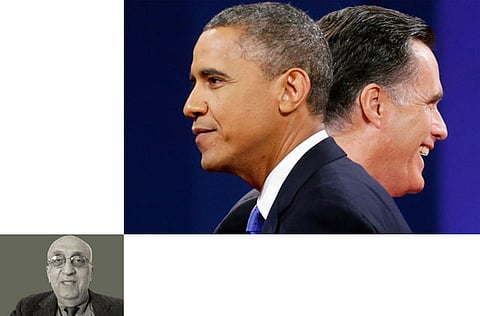Playing politics over Palestine
It is clear that the US administration will not act on a two-state solution

It was bewildering, if not baffling, that neither Barack Obama nor Mitt Romney failed to see last Monday the elephant in their room at their unexciting foreign policy debate during their seemingly tight presidential campaign that partially focused on the Arab Spring and, in general, the Middle East.
The American president and his Republican opponent hardly mentioned the Palestinian-Israeli conflict, now in its 65th year. In fact, a quick Google check found that Obama has not mentioned the word “Palestine” or Palestinian” once while Romney did 35 times.
As the Associated Press noted,“both men voiced heavy support for Israel’s security in an apparent gesture to influential Jewish voters.” In Fact, Romney had claimed ludicrously that the Palestinians have “no interest in peace whatsoever”!
The debate came at a time when Israel had just stopped, once again, a Norwegian boat, the Estelle, from reaching Gaza, the Israeli besieged Palestinian cityon he Eastern Mediterranean and escorted to the Israeli port Ashdod .
In less than two weeks, a new American president will be elected, most likely Obama, but there is little hope that he would once again try as he did when he assumed office four years ago to immediately initiate peace talks between the Palestinians and the Israelis. His failure then to stop Israeli settlements, where now about 500,000 illegal settlers are illegally living on the Palestinian side, halted his attempt.
The 90-minute debate, aired on television nationwide, had hardly any hint that the new administration, Democratic or Republican, would bring the two sides together once again.
“There was no rational or even consequential understanding (by President Obama and Governor Romney) of the dynamics that led to the Arab uprising,” noted former Arab League Ambassador Dr. Clovis Maksoud. He added that underlying their stance vis-à-vis the region “was their competition as to who is closer to Israel’s strategic role and interests in the region.”
He continued:“Focusing on Iran rendered Israel central to both their policies and perspectives of the future. This led to the unfortunate marginalization of the centrality of the Palestinian Question as a main issue of the region and its future.
On the major issue of Palestine, both candidates predicated their policy on Israel’s pivotal role. There was no coherent discourse by either candidate as they were adopting nearly identical narratives which made their evaluation of the region a historical inopportunity.”
Rebecca Vilkomerson, executive director of Jewish Voice for Peace, saw the debate as“dispiriting to watch both candidates race to pander to Israel and vying to demonstrate greater support for more crippling sanctions on Iran.”
She added,“The lack of daylight between the candidates’ views only reinforces the need to continue to build a powerful, grassroots movement that, like our civil rights movement did, will eventually force our government to actually live up to the noble principles of justice and human rights that the candidates talked about tonight.”
Earlier this month, 15 leaders of Christian Churches have sent a letter to the US Congress calling on it “to treat Israel like it would any other country.” Rev. Gradye Parsons, the top official of the Presbyterian Church (USA) went on “to make sure our military aid [to Israel] is going to a country espousing the values we would as Americans – that it’s not being used to continually violate the human rights of other people.”
Their intention was to put the Palestinian plight and the stalled peace negotiations back to the spotlight since surveys, reported The New York Times, have shown that Palestinians and Israelis overwhelmingly support a two-state solution.
What has been most admirable recently has been the undertakings of former President Jimmy Carter who, at 88, was last month in Jerusalem where he declared that Israeli Prime Minister Benjamin Netanyahu has lacked the courage of his predecessors and that he had abandoned the two-state solution. “I do not think there’s any doubt that Netanyahu has decided the one-state option is the one he’s going to pursue” which he described as a “catastrophe – not for the Palestinians, for Israel.”
As for Obama, reported the Times, Carter said, “The U.S. government policy the last two to three years has basically been a rapid withdrawal from any kind of controversy.” But, he continued, “Every president has been a very powerful factor here in advocating this two-state solution. That is now not apparent.” He added the situation is“worse now than it’s been for the Palestinians” because of the expanding settlements and the lack of prospects for change.”
What is it going to take to change U.S. policy which seems to be influenced by the American dictum, “it’s about the economy, stupid!” To a large extent this may be true but any new US administration can’t stay handcuffed for long and neither should the Arab world continue to mark time in the hope that the next US administration will wake up.
George S. Hishmeh is a Washington-based columnist. He can be contacted at ghishmeh@gulfnews.com.


